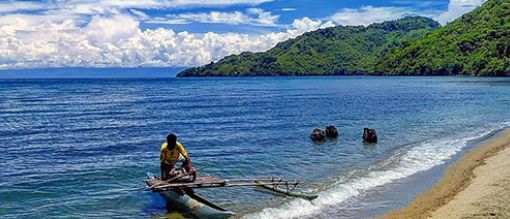Today, a coalition of PNG and Australian civil society organisations have launched an international campaign, ‘No to Wafi-Golpu DSTP,’ which is calling on Australian companies, Newcrest Mining and Harmony Gold (Australia), to abandon their plans to dump hundreds of millions of tonnes of mining waste into the Huon Gulf.
The campaign involves Australian not-for-profits Jubilee Australia Research Centre and Mineral Policy Institute, and PNG organisations, the Evangelical Lutheran Church of Papua New Guinea, which has congregations across the Huon Gulf, and not-for-profit environmental lawyers Center for Environmental Law and Community Rights (CELCOR).
The campaign is providing more information for people concerned about Wafi- Golpu’s plans to use DSTP (deep sea tailings placement). The website can be seen at www.nowafigolpudstp.org
“Wafi-Golpu Joint Venture’s proposal of DSTP is very concerning,” said Mr Peter Bosip, Executive Director of CELCOR.
“Newcrest and Harmony Gold want to dump hundreds of millions of tonnes of mining waste into the ocean that thousands of people depend on. And in order to do so, they are planning a pipeline to run directly through Lae, our nation’s second largest city, including along Mangola Street. Further, that pipeline will cross a seismically active area, before dumping mining waste into the sea,” said Mr Bosip.
Communities across the Huon Gulf have not consented to DSTP, and have been fiercely resisting the plans in protests around the Morobe province.
The mining waste will include arsenic, lead, mercury, manganese and other heavy metals.
The Wafi Golpu Joint Venture’s own Environmental Impact Statement expects that 40 per cent of the tailings will not reach the ocean floor.1 This means that the company potentially expects that 144 million tonnes of tailings will end up in the water column.
However, Professor Ralph Mana, who was involved in an independent review of Wafi-Golpu Joint Venture’s Environmental Impact Statement – a review which has never been publicly released by the Conservation and Environment Protection Authority - has stated that more than 90 per cent of the tailings will end up in the water column and not on the sea floor.
“Professor Ralph Mana’s independent review suggests that the companies’ estimates could be wildly inaccurate. According to Professor Mana, this could equate to 90 per cent of the tailings ending up in the water column. This could be more than 320 million tonnes of mining waste suspended in the water – more than double the company’s estimates,” said Mr Bosip.
“Further, Professor Mana has estimated the mining waste could sweep 30km in all directions in the ocean – which is dramatically different from the estimations given by Wafi-Golpu Joint Venture.”
“The sea is our life,” said Jotham Israel Keleino of the . “It is our supermarket, it is our income, it is our identity and culture. With the sea, we feed our families, through the sea we make income to buy basic goods. We swim in it, we eat from it, we thrive in it. Take away the sea, and you take away our life,” said Jotham Israel Keleino.
“If this DSTP goes ahead, what will this look like in five years for people from Lae who are going swimming or fishing?” asked Reverend Yasam Aiwara, Head of Jabem District of the Evangelical Lutheran Church of PNG. “What impacts will this have on future generations yet to be born?”
The Australian companies, Newcrest Mining and Harmony Gold are joint partners in the Wafi-Golpu Joint Venture.
“We don’t want our children and grandchildren to be left with a dead sea. We don’t want toxic chemicals and heavy metals to make them sick, and unable to make an income,” said Reverend Yasam Aiwara.“We are standing firm, we do not want to leave this legacy for the next generation.”
1 Appendix N to the EIS, at ii. See: https://www.wafigolpujv.com/eis987654321
